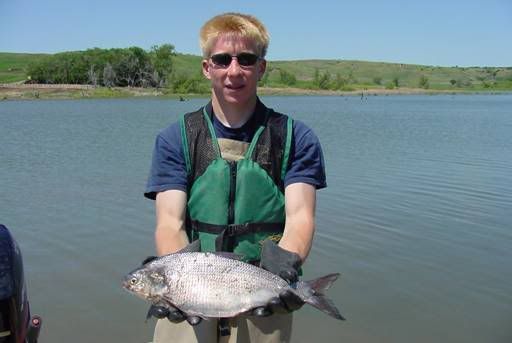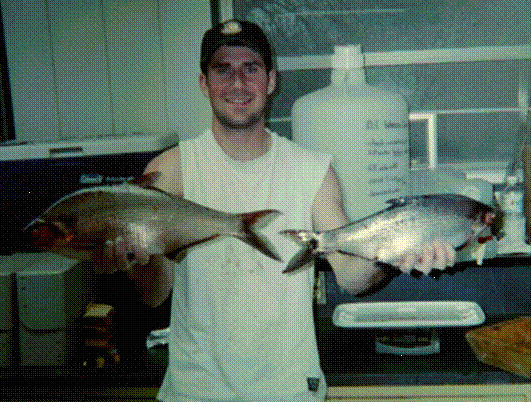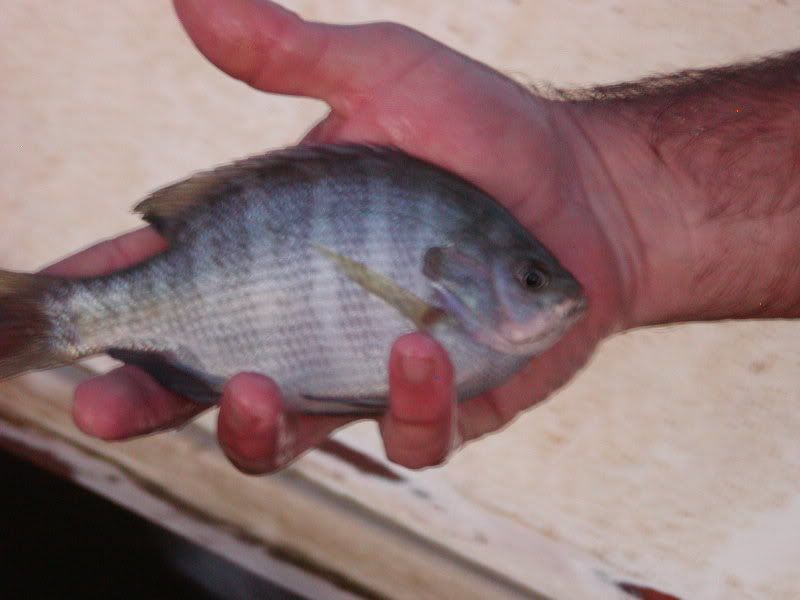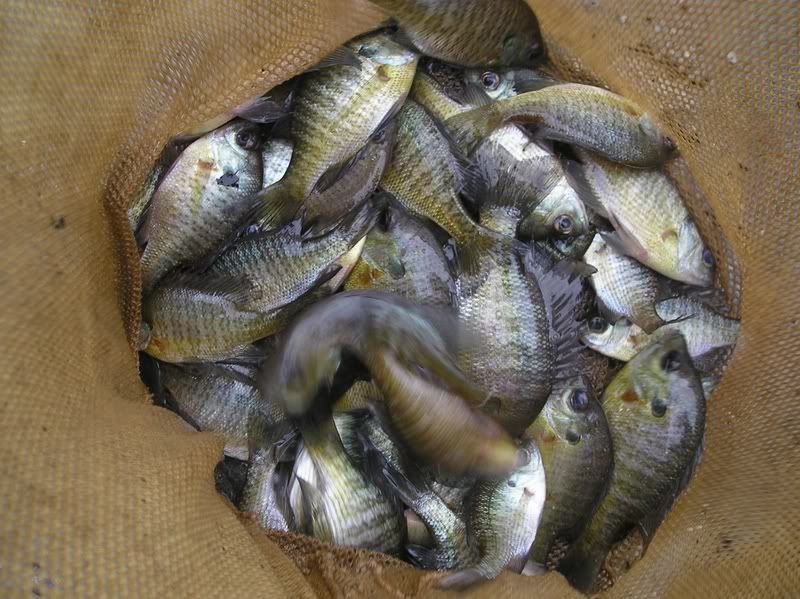|
Forums36
Topics40,963
Posts557,988
Members18,503
| |
Most Online3,612
Jan 10th, 2023
|
|
|
|
Joined: Mar 2005
Posts: 21,499 Likes: 267
Moderator Hall of Fame 2014  Lunker
|

Moderator Hall of Fame 2014  Lunker
Joined: Mar 2005
Posts: 21,499 Likes: 267 |
Greg I agree GShad can work in a trophy LMB pond that is highly managed. That is what K Nutt was talking about in his oft criticized article. Those are a small % of ponds though. But if the owner gets it wrong he gets these   And ends up short of these   And the only way out is rotenone and start over – a high , costly risk for most.
|
|
|
|
|
Joined: May 2002
Posts: 3,973
Ambassador
Field Correspondent Lunker
|

Ambassador
Field Correspondent Lunker
Joined: May 2002
Posts: 3,973 |
yes have seen that happen MANY times and we agree on that part. However also have seen it not happen many times (and not as often as many fear) the bass that are there are like none other. The gizzards ahd are for the most part 9-12 inches with only an occasional one over 14 inches. One exampleis alke that they claim has had gizzard shad for over 20 years and not even well managed. BTW I like that last pic I think that was our fish we brought to you.
One example is the lake you came to for the PB GA meeting. Lake Sovereign was killed off. Before many fish were stocked gizzard shad found their way in via entry creek. That was 5 years ago and they are just now getting to average 12 inches and they have monster bass. This to me is a worst case study they got there before any bass much less like we recommend stocking them after the year 3-4 or high% of bass over 18 inches. In this case it is sad and the fishery will go down hill soon but in the mean time they enjoy the large bass and crappie and they norhtenr bass we stocked to help keep the GZ in check.
|
|
|
|
|
Joined: Jan 2009
Posts: 10,458 Likes: 2
Ambassador
Field Correspondent
Hall of Fame Lunker
|

Ambassador
Field Correspondent
Hall of Fame Lunker
Joined: Jan 2009
Posts: 10,458 Likes: 2 |
If it is tshad, I wonder if that plays into the fact that northern states grow smaller bass. Tshad can't live up north, so bass can't utilize them as a food source. Obviously growing season length and the lack of FL LMB genetics plays a roll as well...
|
|
|
|
|
Joined: Jan 2006
Posts: 16,055 Likes: 277
Moderator Lunker
|

Moderator Lunker
Joined: Jan 2006
Posts: 16,055 Likes: 277 |
Greg, I well may have been wrong because the answer surprised me.
A shame about Sovereign. Kinda reminds me to be careful about what you wish for.
BTW, I have to be careful drinking beer with you. The first time that happened, it cost me the shirt on my back. Tell Wendy I said Hi.
It's not about the fish. It's about the pond. Take care of the pond and the fish will be fine. PB subscriber since before it was in color.
Without a sense of urgency, Nothing ever gets done.
Boy, if I say "sic em", you'd better look for something to bite. Sam Shelley Rancher and Farmer Muleshoe Texas 1892-1985 RIP
|
|
|
|
|
Joined: Mar 2005
Posts: 21,499 Likes: 267
Moderator Hall of Fame 2014  Lunker
|

Moderator Hall of Fame 2014  Lunker
Joined: Mar 2005
Posts: 21,499 Likes: 267 |
CJ some northern waters have other shad types [Clupeidae (Herrings, shads, sardines, menhadens) ] like alewife , blueback and they do have GShad. http://www.pondboss.com/forums/ubbthread...=true#Post13998
|
|
|
|
|
Joined: Jan 2009
Posts: 10,458 Likes: 2
Ambassador
Field Correspondent
Hall of Fame Lunker
|

Ambassador
Field Correspondent
Hall of Fame Lunker
Joined: Jan 2009
Posts: 10,458 Likes: 2 |
Yeah, but Bob specifically mentioned tshad which is why I mentioned it. Most of the reservoirs in my area have either alewife or blueback herring or both as they were trapped when the dam went in. Almost all also have gshad. Perhaps it has more to do with the northern climate and lack of FL LMB genes in the population.
|
|
|
|
|
Joined: Jul 2008
Posts: 172
Lunker
|

Lunker
Joined: Jul 2008
Posts: 172 |
I have a 1 acre pond, someone offered me 50 12" Gizzards so I figured what the hell, I put them in. I really don't care and not too worried about them. It looks at some point I'm either going have to redo this pond or get rid of it so whatever. It would make a good test pond. If I had my guess, I'll never see much of the shad.
I have somewhere around 60 bass ranging from 1-2 pounds up to 8 pounds, one 8 Lb bass and several 4-5 Lb bass were transferred from a nearby lake by a neighbor. Also have around 100 CC in the 3-5 lb. range.
|
|
|
|
|
Joined: Jan 2009
Posts: 10,458 Likes: 2
Ambassador
Field Correspondent
Hall of Fame Lunker
|

Ambassador
Field Correspondent
Hall of Fame Lunker
Joined: Jan 2009
Posts: 10,458 Likes: 2 |
It will be interesting to see how your pond fairs... I suspect with the good number of large sized bass and catfish you have to help control their numbers you'll be OK in the short term. I think you will be OK as far as your bass numbers go. Your BG and other panfish will take a hurting though. I am watching a 4 acre pond that was invaded by gshad 6 years ago go through a transformation right now and am very interested how things play out. Keep us updated... When did you stock the gshad into your pond? Do you have data of Wr on bass and other species in your pond before they were stocked? Would be interesting to compared the before and after...
|
|
|
|
|
Joined: May 2002
Posts: 3,973
Ambassador
Field Correspondent Lunker
|

Ambassador
Field Correspondent Lunker
Joined: May 2002
Posts: 3,973 |
Dave it was not planned in sovereign but I do not feel sorry. The kids enjoy the bluegill. The adults enjoy the big crappie and bass. It will be sad at some point but when they get the "gizz lockup" for now the lake is awesome for monster bass and some agressive northerns we have stocked.
|
|
|
|
|
Joined: Nov 2007
Posts: 125
Lunker
|

Lunker
Joined: Nov 2007
Posts: 125 |
How do Shad work with SMB? Or, do they?
|
|
|
|
|
Joined: Jan 2009
Posts: 10,458 Likes: 2
Ambassador
Field Correspondent
Hall of Fame Lunker
|

Ambassador
Field Correspondent
Hall of Fame Lunker
Joined: Jan 2009
Posts: 10,458 Likes: 2 |
Gshad or tshad?
Each species would have vastly different outcomes and affects...
|
|
|
|
|
Joined: Nov 2007
Posts: 125
Lunker
|

Lunker
Joined: Nov 2007
Posts: 125 |
|
|
|
|
|
Joined: Jan 2009
Posts: 10,458 Likes: 2
Ambassador
Field Correspondent
Hall of Fame Lunker
|

Ambassador
Field Correspondent
Hall of Fame Lunker
Joined: Jan 2009
Posts: 10,458 Likes: 2 |
Tshad would be a good option in many larger southern ponds. However, not many people have SMB in ponds far enough south to also support Tshad...
Gshad, are a struggle to keep with LMB, let alone SMB. Unless you had a pond with 2/3 of the population over 15" and 1/4 over 20", Gshad would make a mess... Even then, it would be risk. SMB have substantially smaller mouths than LMB. I think there are better forage solutions for SMB than Gshad. SMB are far less piscavorous than LMB as well.
In a pond I was looking at raising trophy SMB, I'd use RES, crayfish, LCS, bluntnose minnows and spotfin shiners as the forage base. Once the SMB reached the 18" range, I'd consider stocking GSH as well. That is for a northern pond where Tshad were not an option.
|
|
|
|
|
Joined: Mar 2005
Posts: 21,499 Likes: 267
Moderator Hall of Fame 2014  Lunker
|

Moderator Hall of Fame 2014  Lunker
Joined: Mar 2005
Posts: 21,499 Likes: 267 |
I have a 1 acre pond, someone offered me 50 12" Gizzards so I figured what the hell, I put them in. I really don't care and not too worried about them. It looks at some point I'm either going have to redo this pond or get rid of it so whatever. It would make a good test pond. If I had my guess, I'll never see much of the shad.
I have somewhere around 60 bass ranging from 1-2 pounds up to 8 pounds, one 8 Lb bass and several 4-5 Lb bass were transferred from a nearby lake by a neighbor. Also have around 100 CC in the 3-5 lb. range. Any other forage fish (BG , GShinres , RES , FH etc )?
|
|
|
|
|
Joined: Jul 2008
Posts: 172
Lunker
|

Lunker
Joined: Jul 2008
Posts: 172 |
Everything except RES. One of the many issues with this pond, when it rains even moderately, the water goes over the emergency spillway. Last summer, I sat there and watched hundreds (at least it seemed that way) of 4-5" GSH washing out. I'm intending to fix that issue this summer with an inline water control structure.
Last edited by SK63; 02/23/10 10:05 AM.
|
|
|
|
|
Joined: Apr 2002
Posts: 15,151 Likes: 491
Moderator
Ambassador
Field Correspondent Lunker
|

Moderator
Ambassador
Field Correspondent Lunker
Joined: Apr 2002
Posts: 15,151 Likes: 491 |
With 50 12" GHS in a 1 ac pond, you may not see much of them for several years. Providing they were in good shape going in, they survived and will populate well. If plankton is not available they will eat pellets, then one can watch for them. After several years they could be a big player in the pond and you don't have a clue. They don't bite hooks well and it is really hard for a pond guy to sample them and tell what the population is doing as for numbers and size. As far as I know, about the only way to determine their numbers and sizes is to electro-shock or gill net. This is one of several reasons why I consider gizzard shad risky business unless one has the resources to monitor them.
Last edited by Bill Cody; 02/23/10 10:57 AM.
aka Pond Doctor & Dr. Perca Read Pond Boss Magazine -
America's Journal of Pond Management
|
|
|
|
|
Joined: Jul 2008
Posts: 172
Lunker
|

Lunker
Joined: Jul 2008
Posts: 172 |
I put 50 of them in but yeah, it's very difficult for me alone to assess. This fall, I'll probably bring Mr. Banks out with his electro-boat and see what's going on. I'd be very interested to know but my "test pond" attitude relieves my stress and the stress was very high the first year I had this place. The pond, as a whole, is extremely difficult to manage considering all of the runoff from developments in the watershed.
|
|
|
|
|
Joined: Mar 2005
Posts: 21,499 Likes: 267
Moderator Hall of Fame 2014  Lunker
|

Moderator Hall of Fame 2014  Lunker
Joined: Mar 2005
Posts: 21,499 Likes: 267 |
Shawn can , while you guys check on the status, help fix the pond by taking out what you have to much of.
|
|
|
|
|
Joined: Dec 2005
Posts: 15
Lunker
|

Lunker
Joined: Dec 2005
Posts: 15 |
Would it be easier to control bigger gshad in a pond with a bigger apex preditor such as pike or muskie on a northern pond? Say you have a well established pond with a good number of bigger bass and you choose to use gshad, then how about adding a few pike or muskie.
|
|
|
|
|
Joined: Jan 2009
Posts: 10,458 Likes: 2
Ambassador
Field Correspondent
Hall of Fame Lunker
|

Ambassador
Field Correspondent
Hall of Fame Lunker
Joined: Jan 2009
Posts: 10,458 Likes: 2 |
The problem with pike and musky is they eat what is easiest for them, no necessarily what you want them to... Pike and musky may feed heavily on the gshad, but they may also feed heavily on your YP, walleye and other fish you really don't want them eating... I am not saying there isn't a place for pike or musky in pond management, but it is a very tricky balancing act with lots of room for error to happen. If you're going to use an esox species, use the tiger musky to prevent natural reproduction which may happen with NP. In a pond smaller than 5 acres, I don't think pike or musky should even be considered... In ponds 5 acres and bigger, stocking 1 or 2 a year or every other years is a possibility...
|
|
|
|
|
Joined: Dec 2005
Posts: 15
Lunker
|

Lunker
Joined: Dec 2005
Posts: 15 |
Sure, I understand that predators will feed on whatever is avaliable wheather that is perch or bass or walleye or what have you. However the bigger the predator the bigger it wants its meals. So I guess my question is would they be effective at cropping the bigger gshad, leaving good forage for the other predators.
|
|
|
|
|
Joined: Jan 2009
Posts: 10,458 Likes: 2
Ambassador
Field Correspondent
Hall of Fame Lunker
|

Ambassador
Field Correspondent
Hall of Fame Lunker
Joined: Jan 2009
Posts: 10,458 Likes: 2 |
Sure, they will eat bigger gshad, but they will also eat 10"-14" YP and bass... Usually the size you want for the table... I'd skip the gshad, unless you had a large % of your pond in bass over 20"...
|
|
|
|
|
Joined: Dec 2005
Posts: 15
Lunker
|

Lunker
Joined: Dec 2005
Posts: 15 |
So the cons of gshad are that they get bigger than predators can eat and over time will destroy your fishery by robbing nest of eggs. The pros are that they create an outstanding forage base for a few years with the ability to provide larger prey to large predators. Will golden shiners be able to sustain themselfs if allowed ample time to inhabit the pond before say perch and smb are added? What else could be added that would be a sustainable forage? I've heard that pumpkin seed reproduce to fast for smb to keep up with. Res wouldnt survive our winters.
Last edited by 06will; 02/26/10 11:54 AM.
|
|
|
|
|
Joined: Jan 2009
Posts: 10,458 Likes: 2
Ambassador
Field Correspondent
Hall of Fame Lunker
|

Ambassador
Field Correspondent
Hall of Fame Lunker
Joined: Jan 2009
Posts: 10,458 Likes: 2 |
So the cons of gshad are that they get bigger than predators can eat and over time will destroy your fishery by robbing nest of eggs. There are several cons of gshad. They are not nest egg robbers. Their biggest issue is they reproduce so fast and their young growth so fast, that one, they overpopulate taking up a large percentage of the biomass in a pond. A major reason why even if they are stocked in a trophy bass pond, that pond should be at least 5 acres IMO. With their growth rate, they often outgrow their predator's mouth gape in a matter of a month or two. Large numbers of gshad compete with the young and often even middle sized game fish for food as they feed heavily on zooplankton. The pros are that they create an outstanding forage base for a few years with the ability to provide larger prey to large predators. Gshad provide good forage for a very short period of time to most predators other than large LMB, say over 18" or SMB over 22". That is one big SMB! Gshad and SMB really don't mix... Will golden shiners be able to sustain themselfs if allowed ample time to inhabit the pond before say perch and smb are added? This answer to this question is, it all depends... However, if conditions are favorable, then yes it is very likely golden shiners can maintain a self sustaining viable population in a SMB, YP pond... GSH need areas of shallow water with flooded vegetation to spawn and to use as a nursery for their YOY. Without this, their reproductive success rate will be very low and they will steadily be eaten out of the pond. Stocking golden shiners in advance of stocking particularly the SMB and allowing them a chance to establish and get some size to them, could help in getting them established. SMB are far less piscavorous than are LMB. Another important factor is not allowing the SMB and YP to overpopulate. If they do, they will over predate their forage a well. What else could be added that would be a sustainable forage? I've heard that pumpkin seed reproduce to fast for smb to keep up with. Res wouldnt survive our winters. As you mentioned, you're too far north for RES so they are not an option. Species that I feel could work well in a SMB, YP perch pond are: golden shiners, bluntnose minnows, fathead minnows, spotfin shiners, lake chubsuckers and orangespotted sunfish. Also don't forget that most good SMB ponds have at least a fair percentage of rocky areas. These areas should be utilized for stocking crayfish. SMB love crayfish and will readily feed on them.
|
|
|
Moderated by Bill Cody, Bruce Condello, catmandoo, Chris Steelman, Dave Davidson1, esshup, ewest, FireIsHot, Omaha, Sunil, teehjaeh57
|
There are no members with birthdays on this day. |
|
|
|